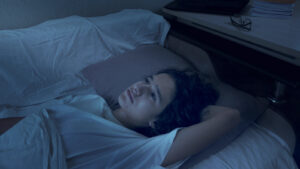Sleep plays a crucial role in growth and physical development during adolescence. That’s why experts recommend that teenagers get 8 to 10 hours of high-quality sleep every night to stay healthy.
The Importance of Sleep for Teenagers
Sleep needs differ throughout a person’s lifespan and vary among individuals. However, experts have developed age-based guidelines outlining how much sleep a person should get every 24 hours.
| Age Range | Recommended Hours of Sleep Per 24 Hours |
|---|---|
| 6-12 years old | 9-12 hours |
| 13-18 years old | 8-10 hours |
| 18 years and older | 7 or more hours |
Adequate sleep is important for teens’ growth and maturation. During sleep, the body releases a hormone that triggers growth, repairs cells, and increases muscle mass. Sleep also affects the way the body releases sex hormones that play an important role in puberty.
Teenagers’ rapidly changing brains need sleep to create new pathways for learning and storing information. Sleep helps teens pay attention and make good decisions. Teens who do not get enough rest may have trouble performing well academically and controlling their behavior.
During this stage of growth, teenagers begin to focus more on interpersonal relationships. Research shows that without enough sleep, teens may have a harder time resolving conflict and are more likely to engage in violent or dangerous behavior.
Additionally, getting regular, restful sleep helps teenagers regulate their emotions and protect their mental health. Evidence shows that sleep-deprived teens have more emotional difficulties, including depression and anxiety.
Middle Schoolers
According to the Centers for Disease Control and Prevention (CDC), nearly 60% of middle school students get fewer than nine hours of sleep on school nights. Sixth graders are most likely to get insufficient rest, with 61% sleeping for fewer than the recommended number of hours.
Few studies have explored how sleep deprivation impacts middle schoolers specifically. Some evidence suggests that kids in early adolescence who get poor-quality sleep might be more likely to experience depression later in their teen years. But a full understanding of how sleep loss affects younger teens will require more research.
High Schoolers
Data from the CDC indicates that over 70% of high schoolers get fewer than eight hours of sleep each night during the school week. There are many possible reasons why high schoolers get so little sleep, including social media and technology use, early school start times, and overloaded schedules.
Many teens begin driving in high school, which makes sleep even more crucial. Sleep deprivation is frequently implicated in traffic accidents. Teens who sleep fewer than seven hours a night are more likely to drink and drive, skip wearing a seatbelt, and text while driving.
Shop the Best Mattresses for TeenagersDo Teens Need More Sleep Than Younger Children?
Younger children need more hours of sleep each day than teenagers, but teens often have more difficulty prioritizing sleep as they grow increasingly independent.
Hormonal changes during adolescence lead many teens to stay up later and sleep in more than younger children. When teens are not able to get enough sleep during the week, they may try to make up for it by sleeping late on the weekends. This can further disrupt their sleep schedules and lead to a condition known as social jetlag, or long-term sleep deprivation.
The Consequences of Sleep Deprivation in Teens
Sleep deprivation negatively impacts the brain and body in a variety of ways, and evidence suggests that sleep loss might be particularly harmful to teens’ mental health.
Without enough sleep, teens may experience symptoms such as mood changes, irritability, and anxiety. Underslept teenagers have an increased risk for mental health symptoms like:
- Self-harming behaviors
- Poor emotional regulation
- Feelings of hopelessness
- Depression
In addition, insufficient sleep may increase the chances of risky behaviors among teens, including drowsy driving, drug and alcohol use, fighting, and carrying weapons.
Tips to Help Teens Get Better Sleep
Setting limits for adolescents can be tough, especially as they explore their growing autonomy. While a teenager may not be thrilled about putting aside their smartphone or giving up video games before bed, a respectful and honest discussion can help them understand why it’s important to prioritize their sleep.
There are many ways parents and caregivers can help teens sleep better. When possible, it’s helpful to collaborate with teens on solutions like schedule changes and steps to improve their sleep hygiene.
- Maintain a consistent sleep schedule: Encourage a teenager to go to bed and wake up at the same times every day, even on weekends. They should avoid sleeping more than 30 minutes past their typical wake time. Getting up too late can disrupt their sleep patterns and make it hard to wake up early during the week.
- Promote regular physical activity: Teens need adequate sleep, a healthy diet, and plenty of exercise to stay healthy. Studies show that being physically active during the day can help people sleep better. Avoid high-intensity exercise too close to bedtime, however, as it can make it harder to fall asleep.
- Avoid blue light before bed: Electronic devices like laptops and cell phones emit blue light, which can make it harder to fall asleep. Consider making devices off-limits for one hour before bedtime, including video game consoles.
- Limit caffeine consumption: Teens should avoid consuming caffeinated drinks in the evening. Caffeine is a stimulant that can keep users up at night. Caffeine’s effects may take up to eight hours to wear off, so an energy drink after school may come with unwanted effects at bedtime.
- Encourage stress-relieving activities: Stress and anxiety are associated with difficulty sleeping. Caregivers can encourage teenagers to find healthy outlets for stress, such as hobbies or sports they enjoy. Learning relaxation techniques like yoga or meditation can also be helpful.
- Commit to changes as a family: Some strategies may be more effective if all family members commit to lifestyle changes together. Consider making a family rule about avoiding electronics before bed, for example, and encourage everyone to stick with it.
Teens should talk to their doctors if they have persistent trouble falling or staying asleep or if they are excessively sleepy during the daytime. Symptoms of depression or anxiety also warrant a call to the doctor. Since there are serious consequences to sleep deprivation, a health care provider can assess the problem and develop a treatment plan.
References
Get Your Sleep Questions Answered Live on 4/30
Have questions about sleep? Get all your sleep-related questions answered in a Live Q&A on YouTube with renowned sleep expert Dr. Michael Breus at 5 p.m. PST/8 p.m. EST.







